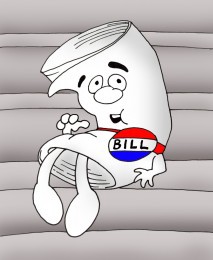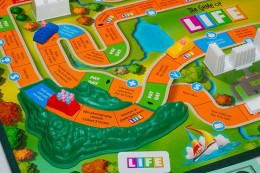What’s ENTAILED In Making a Will? (Get it? “Entailed”?)

Pretend that says “Will”
All right, kiddos! It’s time for Part II of the conversation begun last week about estate planning for millennials, wherein we find a lighthearted way to talk about money and death. There should be a Schoolhouse Rock! cartoon on the subject. Unfortunately the show went off the air before it could find a catchy way to address the importance of bequeathing your earthly possessions and making provision for your dependents and heirs, so we’ll have to make do the best we can. Let’s start at the top.
WHERE THERE’S A WILL, THERE’S A WAY: What is a will exactly? Is it different from a Living Will? Is there such a thing as an Unliving, Unleavened, or Zombie Will? Do we still “entail” things, like they do on “Downton Abbey”? What if we’ve got nothing to leave but debt and a questionable browser history?
First, what is a will? According to the online service site RocketLawyer.com:
A Last Will and Testament is the cornerstone of every estate plan. It allows you to distribute your assets, appoint guardians for your children, and even provide for a favorite charity. But an estate plan doesn’t end there. A Power of Attorney, for example, lets you appoint a trusted family member to make financial and medical decisions on your behalf, while a Living Trust can help you provide for your children without the hassles of probate court.
Why is it important to have one, even as a young-ish person? Get Your Shit Together sums up some of the reasons it will suck for those who remain here after you’re gone if you haven’t left clear, legally-binding instructions, printed out and signed by witnesses:
Your friends and family will have to spend days or weeks digging through your things to figure it out for you. But it is often not that easy and we’ve all heard the tragic stories: Family relationships destroyed, custody battles, long and confusing probate process, money that should go to survivors eaten away by court battles. Your relatives could easily make decisions you would disagree with, or even much simpler, you always wanted xx to have your yy, but no one knew.
Millennials — often called the YOLO or Selfie generation, currently between the ages of 19 and 36 — may not have the kind of assets that AARP-types do, but plenty of us have the little blue or pink pegs in the back of the plastic car and other accoutrements of traditional adulthood. “About half of older Millennials are married, and about half have kids (although not necessarily the same half),” points out Forbes.

image via Mental Floss
Many of us already own, or value the idea of owning, property, though figures vary widely as to how many. According to a Better Homes and Gardens survey, “nearly 80 percent of millennials see owning real estate as their number one priority,” while AARP claims: “Only 18 percent of men and women ages 18 to 34 say owning their own home is one of the most important things to achieve in their life.” Either way, even if all we have is a raging collection of vintage Hot Wheels, put it down on paper that you want them to go to your niece Brooklyn, and you’ll never have to worry about it again.
If you have debt, you might be relieved to know, it dies with you. That’s the short answer, anyway. There are some complications and provisos, so feel free to read on: How Stuff Works covers the issue in depth.
Okay, so what, by contrast, is a Living Will? Well, remember Terri Schiavo? She was only 26 when she collapsed at home, “suffering from heart failure that led to severe brain damage because of lack of oxygen.” She remained in what’s called “a permanent vegetative state,” sustained only by a feeding tube, for over a decade, until she was 41. The case of whether or not to pull the plug became a media circus, pitting Schiavo’s parents and the bombastic piety of senators, judges, a governor, and even the President of the United States against doctors and a husband who claimed he understood best what she would have wanted. All because she never made a Living Will.
Your living will designates the plan of action for your life, or your end of life, based on your beliefs, values and most personal wishes, and ensures that plan gets implemented without guessing or disagreements. Everyone should specify a medical power of attorney. If you are not legally married (or unable to marry legally), it can be unclear who is to make medical decisions on your behalf without a living will. Designate someone you trust to be able to, even under emotionally grueling conditions, implement your plan.
So, if you want your live-in lover, or primary poly partner who lives in Oregon, or just your best friend from childhood to have final say over what happens to you if you get hit by a bus, rather than your parents, your Living Will is the place to make that known.
So what are you waiting for? Make it your One Thing.
Oh, and no, if you live in the U.S., most likely you never even have to understand the concept of an “entail.” Phew.
Support The Billfold
The Billfold continues to exist thanks to support from our readers. Help us continue to do our work by making a monthly pledge on Patreon or a one-time-only contribution through PayPal.
Comments